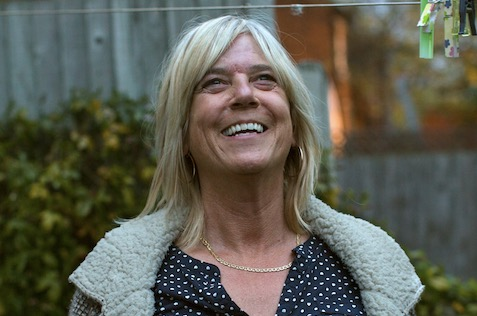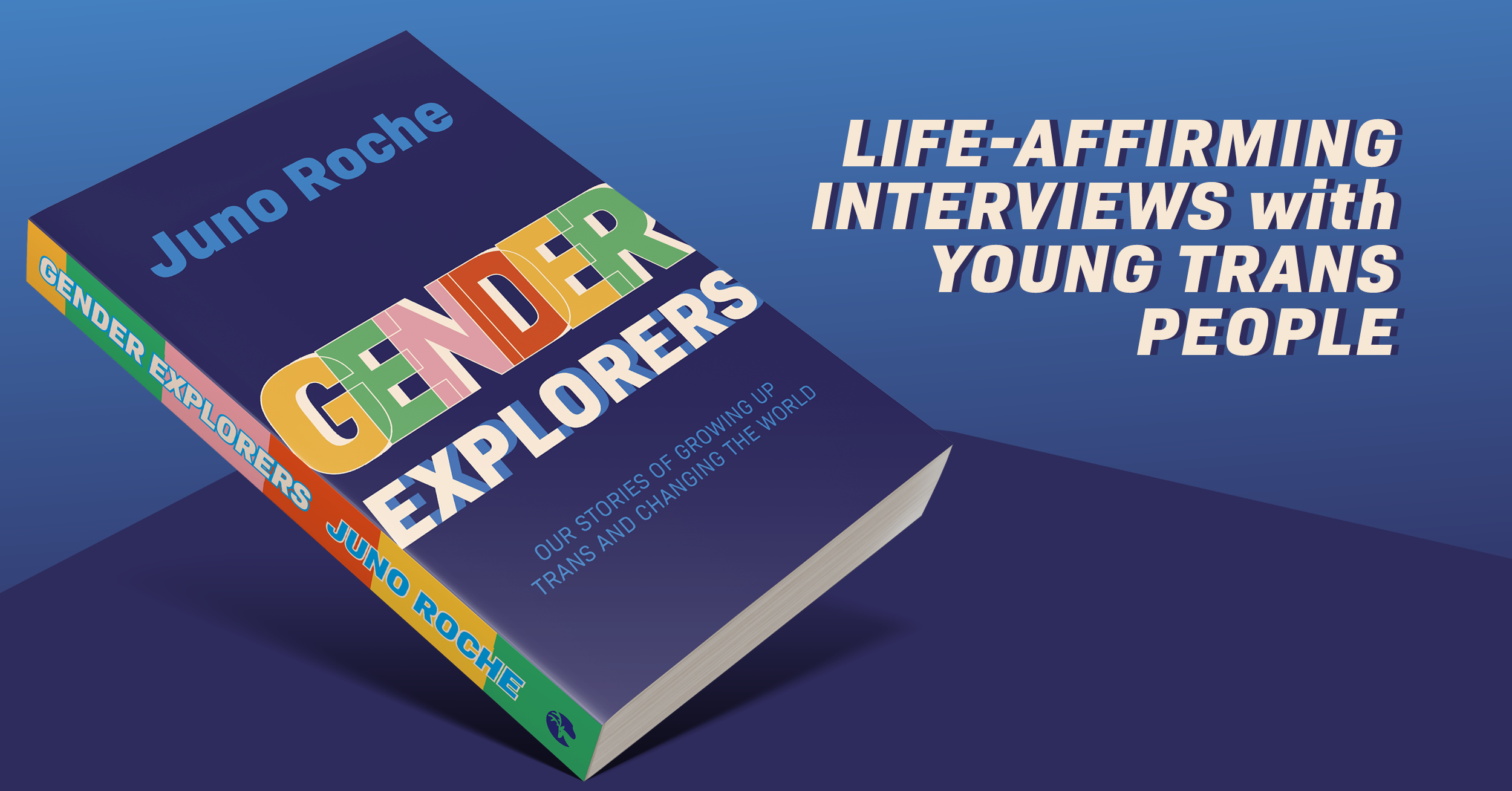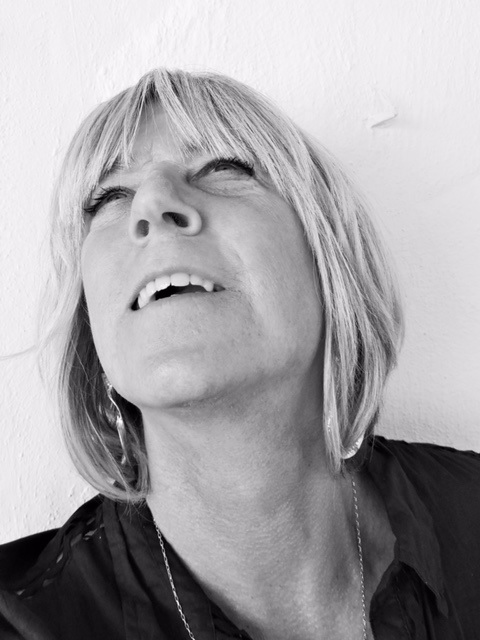Acclaimed trans author Juno Roche is telling the vital stories of young ‘gender explorers’ – and it’s time we all listened

Author Juno Roche. (Supplied)
Juno Roche, acclaimed author of Queer Sex and Trans Power, is bringing a much-needed dose of optimism with their new book, Gender Explorers.
In the book, Roche speaks to trans and non-binary children and young adults, along with their parents, about the experiences growing up trans. Because now, more than ever, it’s time we listened to trans kids.
I talk a lot – many people say I talk far too much – but when I am in the presence of young trans children and teenagers I’m often silenced by the way that they are navigating the complexities of life itself and handling the complex pressures of gender expectations and stereotypes. The pressures are most often coming top down.
In the course of writing this book I had the chance to travel the country and interview many trans and non-binary children and teenagers and I was constantly amazed and often stunned by the kindness they demonstrate and exhibit towards a world which so frequently treats them very badly. They simply see themselves as trying to be the best that they can be and trying to be true to their innermost feelings. They often readily forgive the world for treating them so badly. Again, in teacher speak, they are trying to live up to their potential.
I’m someone who transitioned late through a formal, medicalised and often punishing process demarcated by stages of negative and positive interventions. This process only began after spending many unhappy years hiding the truth of my gender misalignment because I wanted and needed to please the world around me that was constructed upon a binary patriarchal thinking. It’s taken me years to live up to my true potential.
I sometimes wonder if the word ‘transgender’ applied to a five-year-old who is determined to be themselves, whatever the cost, makes any sense in the way it does perhaps applied to me? They are merely expressing their gender, or expressing their sometimes tentative, sometimes bold, enquiries and exploration into gender.
After speaking with many young trans children and teens I wonder if the word ‘transgender’ applied to them isn’t a tad misleading as they are just being as they need to be. For them there is often no transitional process as I perceived and lived it, but often a joyful, playful journey from the get-go towards their authentic core. They leave a starting point with a determination to be themselves from as close to day one as possible.
If supported and simply allowed to be themselves, their journey feels natural and ordinary. ‘It’s just normal,’ many of them said to me.
It’s often the ‘grown up’ intervention that creates the environment for depression, darkness, sometimes suicidal ideation and perhaps even attempts. When the loaded label ‘transgender’ is applied to a five-year-old who is just being true to themselves I’m not sure that the label works to create any positive framework. One parent told me that her daughter didn’t really know or understand the word ‘transgender’ until she was 10, when it felt important, politically, that she understand the context for the discrimination that might come her way. The word ‘transgender’ as a conduit for discrimination.
I like the terms ‘gender boss’ or ‘gender explorer’. That isn’t to say that these young people don’t have to engage with a process (sometimes medical, often therapeutic), but if the starting point is joyous and determined, then the process is entirely different from the one we more closely associate with the label ‘trans/transgender’, which is applied to those of us who transitioned later in life.
From the outside these young people may appear to be products of patriarchal and socialised patterns of gender expression: ‘I felt like a boy’, ‘I wanted to climb trees’, or the classic ‘I like pink’. But look a little closer and you will see the marvel of a human, a tiny human, grappling with and bossing gender from the outset, saying, ‘No, you’ll do what I need you to do. Forget all those people around me telling me I’m wrong, telling me I should be this way or that. I want to be happy, not sad, and I want to express myself the way that feels right for me.’

Juno’s book Gender Explorers.
Juno Roche interviews ‘Trans Teen Who Identifies as a Non-Stereotypical Girl’.
Where would you say you are happiest?
Either Crewe train station or the viewing place next to Manchester airport or at Disneyland Paris.
Why are those your happy places?
I have a big interest in trains. Me and my dad used to go there all the time. We sometimes still go. At Crewe it’s a junction and there are six lines that meet there. It’s interesting. I can identify trains by the sound of them. I can do that with airplanes as well.
So, with your eyes closed, if a train passed here now could you tell what kind of train it is?
Yes, of course.
Disneyland Paris feels different.
I’m obsessed with Disney. I especially like the animated classic films and the Pixar films.
What’s your favourite Pixar film?
Ratatouille.
I once saw all the original Pixar models for the films at an exhibition. They were beautiful. Does animation link into a future career that you might want?
No, I want to be a stock trader.
A stock trader – like stocks and shares? Why stock trading?
I have a big interest in maths and that’s a maths heavy career. It’s like a dull stable career.
Did you enjoy being at school?
It was alright. I always had friends I knew I could go to and depend on.
Did you express your gender at school?
I came out in Year 9 and came back in Year 10 as me.
What was that like?
When I first went back in the door I was terrified, but soon I realised that everyone was nice about it. Even the people I was expecting to not have nice reactions didn’t seem to care.
So, what you expected to happen and what did happen were completely different. If someone were reading this and they were expecting the worse, what would you say to them from your experience?
Society is progressing at an astonishing rate. I’d say don’t be afraid to come out and try to be as open as you can be. Try not to get defensive. It’s hard but try not to. If someone asks you a question and you don’t feel comfortable to answer, just tell them you don’t feel comfortable with their questions. Sometimes people are scared about asking questions. I’d say be approachable as it might make your experience better, easier. Maybe it’s even helping our wider community by educating them and stopping them from getting bad information from bad sources.
Do you feel that you are making a difference to the world?
I guess. I try to be open – not if someone asks me something too personal, but I want to break down stereotypes, so I speak up. I think breaking down barriers is important. Being trans doesn’t define me. I’m not going to just become super-girly. If someone buys me anything sparkly for my birthday, I just think that’s really wide of the mark. I still wear men’s jeans. I’m a girl but not a girly girl. I don’t let being trans define me. I am my own person. I make my own rules.
Who helped you the most to get to this point?
I can’t attribute it to one person. I could probably narrow it down to close family – for example, my mum [turns to mum briefly]. She was very supportive when I came out. She said, ‘I don’t have the information but I’m going to educate myself so I can be there for you.’ It led her to work for Mermaids. But my grandad has been one of my favourite people since I was little.
He was part of the reason I connected to trains and planes. People say that the older generation won’t understand or be accepting, but he couldn’t be more accepting. He and my nan are so chilled about it. Mum told them because I was too scared to be in the room and I was sat on the stairs outside the room. Grandad was like, ‘There’s nothing wrong with that’.
I almost started crying because I knew it was going to be so much easier than I’d imagined. But the other person who’s been helpful has been my closest friend who I’ve grown up with. She’d always be there for If I had trouble explaining something, which I sometimes do, she’d say, ‘Don’t worry, take your time’. I had a friend at school who transitioned and made it seem so straightforward. Before then I’d really struggled. That friend really helped.
You are a great interview; I know you were worried about talking. If you could time travel back to the you in Year 7, what would you say?
Society is moving really fast. You’re transitioning and being trans doesn’t have to create any barriers for you. Don’t try to force yourself into any gender stereotype. When I first came out, I tried to please everyone by being super-girly but then I gave up. I saw my old men’s jeans and I thought, ‘They’re convenient, they fit and they have pockets.’ I’ve been wearing them ever since. Just be yourself; and if anyone asks you why you aren’t being stereotypical, just say that being trans is about overcoming stereotypes. Just live your best life.
I’m blown away by your words, thank you.

Juno Roche.
Juno speaks with ‘Trans Teen’s Mother’.
Can you remember your daughter coming out to you?
Mum: Yes, it was the day that David Bowie died.
How did you feel?
To be honest I’d always been waiting for something. A lot of people around us assumed she was going to come out to us as being gay. As her mum I knew it wasn’t that. I wasn’t sure what it was. I was in my bedroom reading. No, actually before then I’d suspected that she might be trans, so I organised a trip out to see the film The Danish Girl.
I pretended to have a spare ticket so she could come along. But the day that she came out I was sitting on my bed reading and she came in, sat down and said, ‘You know that film, The Danish Girl, well that’s me’. So, I said, ‘You feel female on the inside?’ And she said, ‘Yes’. I asked her what she wanted to do about it, and she said she didn’t know. I said, ‘We can find out’.
Your reaction was very matter of fact. Why do you think you took it in your stride?
When I was seven… [Pause.] Do you remember The New Avengers?
Yes, absolutely.
At seven I said that I wanted to marry Purdey. I had the Purdey haircut. I used to practise my Purdey kicks. I didn’t know then that I was bisexual. I didn’t know the words and I’m never sure what my word is. But my older sibling, who was nine at the time, took me to one side (being an older protective brother) and told me that I couldn’t ever say that. He told me it wasn’t allowed and that I’d get my head kicked in.
It was the early ’70s and he was probably right. It was an incredibly homophobic time. But at seven years old to be told that something that just feels like the most natural and beautiful thing is not only wrong but could put you in danger… What do you do with all those natural feelings at seven? Well, you push them down and down until you get a knot. I think every LGBT adult knows deep down when they got their knot. I call it my Purdey moment.
Because I was waiting for something with my own child, I was constantly remembering my Purdey moment and I was just determined that, whatever it was, she was not going to have those feelings. When it came to her making her social transition, it was a case of ‘You are either 100 per cent positively onboard or you are out of our lives. I don’t care who you are, you are out of our lives’. It mattered so much to me that whoever she is, it is right. Not even up for discussion.
That’s such a powerful message, that Purdey moment and not wanting someone else, your daughter, to have that moment. I had my own Pansy moment at eight years old. If somebody hasn’t had their own Purdey moment, what would you say to them? How would you explain or express that moment to them?
I don’t know. You can only go on your own childhood experiences. When a child comes out to a parent, we are all experiencing that from completely different starting points.
So how might you explain how that knot feels?
It feels like sudden, instant anxiety that something awful is going to happen any second, but it’s a permanent state. Most people only experience that for a few seconds. But when that’s a permanent state in your life, it feels overwhelming. But I also thought I was the only one because back then in the 70s there were no lesbian or bisexual women anywhere – they didn’t exist. They weren’t in books, in films or in Coronation Street. I thought I was the only one who felt like that, so I felt like there must be something wrong with me.
If there were a scale of one to ten for that pain (ten being the most painful), where is that pain on that scale? What does that pain physically feel like?
A 10. Physically it feels like butterflies in the stomach, but not in a nice way.
To me it felt like a crow flapping wildly inside me. That horrible feeling of unrest. If you could give any words of advice to a parent who may be going through this process, what might they be?
I would say that you never get a second chance at a first reaction. Put love first, unconditional love first. Anything else can be worked out.”
Extracted from Juno Roche’s Gender Explorers: Our Stories of Growing Up Trans and Changing the World.

